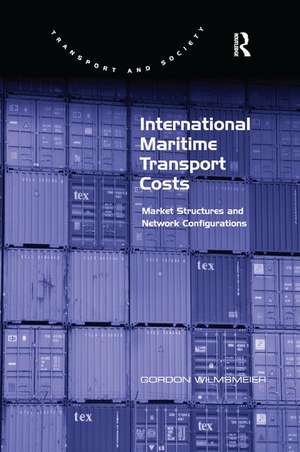International Maritime Transport Costs: Market Structures and Network Configurations
Autor Gordon Wilmsmeieren Limba Engleză Paperback – 5 feb 2018
| Toate formatele și edițiile | Preț | Express |
|---|---|---|
| Paperback (1) | 436.14 lei 6-8 săpt. | |
| Taylor & Francis – 5 feb 2018 | 436.14 lei 6-8 săpt. | |
| Hardback (1) | 1058.65 lei 6-8 săpt. | |
| Taylor & Francis – 28 noi 2014 | 1058.65 lei 6-8 săpt. |
Preț: 436.14 lei
Nou
Puncte Express: 654
Preț estimativ în valută:
83.48€ • 86.82$ • 69.95£
83.48€ • 86.82$ • 69.95£
Carte tipărită la comandă
Livrare economică 13-27 martie
Preluare comenzi: 021 569.72.76
Specificații
ISBN-13: 9781138547193
ISBN-10: 1138547190
Pagini: 224
Dimensiuni: 156 x 234 x 12 mm
Greutate: 0.45 kg
Ediția:1
Editura: Taylor & Francis
Colecția Routledge
Locul publicării:Oxford, United Kingdom
ISBN-10: 1138547190
Pagini: 224
Dimensiuni: 156 x 234 x 12 mm
Greutate: 0.45 kg
Ediția:1
Editura: Taylor & Francis
Colecția Routledge
Locul publicării:Oxford, United Kingdom
Cuprins
Contents: Foreword, Jan Hoffmann; Introduction; Theoretical framework; Determinants of maritime transport costs - defining the dimensions of complexity; Empirical analysis; Revealing the complexity of maritime transport costs - empirical results and analysis; Beyond the role of distance - maritime industry and network structures - as determinants of competitiveness in international trade; Appendices; References; Index.
Notă biografică
Gordon Wilmsmeier is Economic Affairs Officer at the United Nations Economic Commission for Latin America and the Caribbean (UN-ECLAC) and Honorary Professor for Maritime Transport Geography at the University of Applied Sciences, Bremen, Germany.
Recenzii
’The globalization of trade makes maritime transportation a remarkably important derived service in the world economy. Gordon Wilmsmeier analyses the most crucial factors that explain the complexity of maritime transport costs over the last decades in Latin America, a region that is highly dependent on maritime trade, and evaluates its relative importance using a comprehensive empirical approach which is clear, path-breaking and up-to-date.’ Inmaculada Martinez-Zarzoso, University of Goettingen, Germany and University Jaume I, Spain ’International Maritime Transport Costs provides a unique piece of knowledge about transport costs and the impacts on economic development. Research, theory, examples from the industry and much more are combined in this work creating an indispensable benchmark which can now be applied directly towards more sustainable economic development around the world.’ Ricardo J. Sanchez, United Nations ECLAC, Chile ’As both globalization and the restructuring of global product and service value chains have promised greater prosperity to less developed nations, and trade facilitation efforts have enhanced that promise, international transport costs have challenged that progress. Gordon Wilmsmeier has stepped fearlessly into the quagmire of trade and transport relationships, decomposed the elements impacting transport costs in Latin America and skillfully evaluated the contribution of a wide range of cost influencers from market demand to traditional distance arguments to port reform. His conclusions will prove insightful to government policy makers as they seek to understand the complexity of transport costs and improve economic outcomes for their country or region.’ Mary R. Brooks, Dalhousie University, Canada
Descriere
Based on in-depth empirical research, this book develops our understanding of maritime transport costs, the maritime industry and the competitiveness of regions in a global market environment through a geographical lens. Further, the book uses a unique set of data that gives an extensive insight into Latin American international maritime transport costs and its determinants. This is a clear call for policy makers and port authorities to strengthen transnational cooperation in order to improve the development of the whole system of maritime transport, focusing on the causes that put regions at risk of becoming peripheral and uncompetitive.
